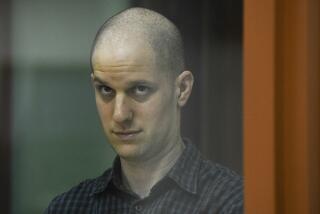Russian Back in U.S. for Digital Book Case
- Share via
SAN JOSE — Dmitry Sklyarov, the Moscow software programmer who wrote the code that cracked Adobe Systems Inc.’s eBook, is back in the United States more than a year after he was arrested on software piracy charges.
Sklyarov, who spent weeks in jail in 2001 on charges that he violated a 1998 digital copyright law, will tell a jury that his employer, ElcomSoft Co., didn’t commit a crime when it sold software on the Internet that could disable restrictions on Adobe’s eBook software. This week in a San Jose courtroom, the case against the firm will test whether the law turns legitimate programmers into criminals.
Some in the software industry, which loses $11 billion a year to piracy, say the Digital Millennium Copyright Act is a deterrent. Lawyers say a potential prison sentence should make people uneasy about the DMCA, which prohibits software that allows users to open digital works protected by copyright.
“It’s easy to violate the DMCA,” said Jonathan Band, an intellectual property lawyer not involved in the case. “It covers circumvention activities even when there’s no intent to infringe.”
“Without strong copyright protections, there’s no incentive for anyone to develop software,” said Jeri Clausing of the Business Software Alliance.
San Jose-based Adobe told federal authorities last year that Moscow-based ElcomSoft was selling a program that “picks the lock” to its electronic book reader, software that allows users to buy books off the Internet to read on their computers.
In July 2001, Sklyarov, who wrote the program for his doctoral dissertation, was arrested at a conference in Las Vegas where he was scheduled to present a paper on Internet security. ElcomSoft was indicted the following month. Sklyarov and ElcomSoft pleaded not guilty, claiming that the software allows users to copy text from eBook to use in other forms.
Daniel Harris, a Silicon Valley intellectual property lawyer, says criminal penalties under the DMCA may discourage companies that create circumvention tools as a part of their software development from pursuing that business model.
“The bigger issue is whether this is conduct that needs to be criminalized,” said Harris, who represents Lindows.com, a company trying to make software that allows Microsoft Corp.’s Windows products to work on a Linux operating system.
In an agreement with the government, Sklyarov was released and charges against him were dropped under the condition that he would testify as a prosecution witness if needed.
The arrest sparked protests from some within the software industry and from organizations such as the Electronic Frontier Foundation that say computer code is language that deserves free-speech protection. They say the DMCA is unconstitutional.
Adobe withdrew its support for the criminal prosecution of Sklyarov a week after the arrest. The firm still is cooperating with the government in its case against ElcomSoft, according to its Web site.





